Common Reasons for DNA Testing in Standard
Establishing parentage for custody/support.
Accredited Drug Testing Inc provides DNA testing that serves as irrefutable evidence of biological parentage in legal cases. This genetic proof is crucial for courts to decide parental rights and responsibilities, including child support, ensuring that judicial decisions are informed and equitable.
Confirming familial relationships.
Our genetic testing services thoroughly verify familial relationships, addressing uncertainties among family members. These precise results are indispensable for settling disputes over inheritance and offer peace of mind by verifying sibling or other kinships, strengthening family unity in meaningful ways.
Immigration cases requiring proof of biological relationships.
DNA tests are a reliable means of establishing the biological relationships required in immigration proceedings. Our court-admissible genetic testing clears hurdles for visas or citizenships by providing the necessary documentation to immigration officials, facilitating the reunification of families.
Adoption cases or identifying unknown biological relatives.
In adoption processes, DNA testing shines a light on genetic heritage by identifying unknown biological relatives. This insight can provide adoptees with a profound sense of identity and emotional resolution, along with impactful family health information crucial for medical histories.
Genealogy and ancestry exploration.
Our genealogical DNA tests offer a journey into your family's past, uncovering ethnic roots and connecting you with distant relatives. By exploring ancestral DNA, individuals gain a richer understanding of their heritage, promoting a deeper bond with their cultural origins and historical family ties.




